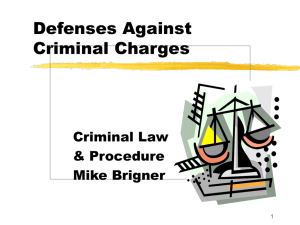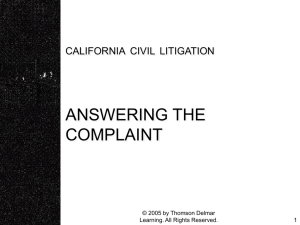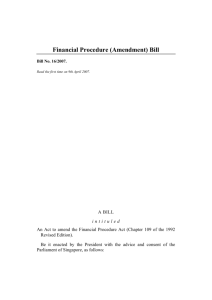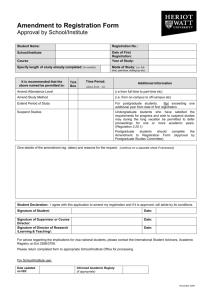Slides from Class 8 - The Catholic University of America
advertisement
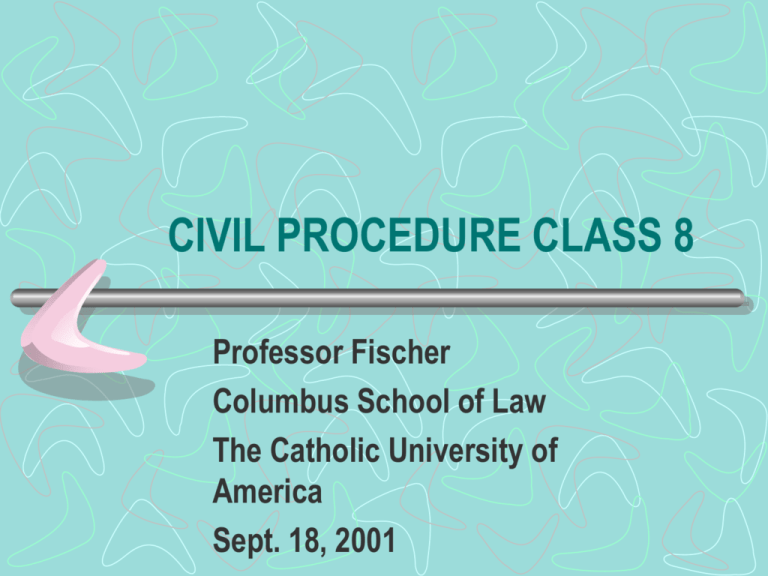
CIVIL PROCEDURE CLASS 8 Professor Fischer Columbus School of Law The Catholic University of America Sept. 18, 2001 WRAP-UP OF LAST CLASS • Service and filing requirements for Answers (Rule 5) • Pleading requirements for Answers: 8(b)-(e) • Only types of responses in Answer: Admissions, denials, deemed denials, 12(b) defenses, affirmative defenses (8(c) ) WHAT WILL WE DO TODAY? • We will continue to examine admissions, denials and deemed denials • We will discuss amendments and FRCP 15. Time permitting, we’ll discuss relation back. • We will discuss Practice Exercise 9. • We will end this class early (at 7:45) to enable any students who wish to do so to attend the 8:00 p.m. University candlelight vigil for the victims of last Tuesday’s tragic events. 3 PLEADING OPTIONS IN ANSWER • Admit • Deny • Deemed Deny ADMISSIONS • 8(b) - Can make specific admissions • 8(d) - Anything not denied is deemed admitted SO BE CAREFUL! • Exception - where an answer would subject a party to criminal charges, the 5th Amendment of the U.S. Constitution protects him DENIALS • 8(b)- D need only deny allegations in the complaint that she actually disputes. It’s typical to deny entire paragraphs but that is not always appropriate - see UNUSUAL Zielinski case (E.D. Pa. 1956) (see at: http://classes.washburnlaw.edu/lass/coursemat/200 0fall/cases/Zielinski_v_Philadelphia.htm) • Specific Denial - deny particular portion of a claim (see Rule 9 for some matters that must be specifically denied) • General Denial - deny each and every averment of Complaint DEEMED DENIALS • Effect of pleading that D is “without knowledge and information sufficient to form a belief as to the truth of an averment”. • How much inquiry must a D make prior to pleading a deemed denial? See Greenbaum v. U.S. (E.D. Pa. 1953) ; Controlled Environment Systems v. Sun Process (N.D. Ill. 1997) Greenbaum v. U.S. • What was substantive dispute? • What was the procedural issue? • How did the E.D. Pa. Resolve this procedural issue? • Didn’t court disregard anti-waiver provision of 12(h)(3)? Controlled Environment Systems v. Sun Process Co., Inc. • What was the problem with the plaintiff’s pleading in para. 10 of the answer to counterclaim? DEEMED DENIALS • 1. One can lack knowledge but still have enough information to form a belief under 8(b) • 2. Denials containing the phrase “on information and belief” is generally accepted but is not recognized as a denial by 8(b) AFFIRMATIVE DEFENSES • Some defenses must be affirmatively pleaded under 8c • 1. ENUMERATED: E.g. contributory negligence, fraud, res judicata • 2. UNENUMERATED: Also “any other matter constituting an avoidance or affirmative defense” • CONCEPT: Is D relying on some new facts that would come as a surprise at trial? UNENUMERATED AFFIRMATIVE DEFENSES • How does the D know if something is an affirmative defense or not? UNENUMERATED AFFIRMATIVE DEFENSES • How does the D know if something is an affirmative defense or not? • Research - there may be relevant court opinions • D may be able to construe statutes to discern whether language gives rise to affirmative defenses CONSEQUENCE OF FAILING TO PLEAD AN AFFIRMATIVE DEFENSE • What happens if D fails to plead an affirmative defense? CONSEQUENCE OF FAILING TO PLEAD AN AFFIRMATIVE DEFENSE • The defense will be waived, unless the court allows amendment • In determining waiver, courts will examine: • 1. whether P had knowledge of the facts • 2. Prejudice to P resulting from failure to plead • If wrongly plead as counterclaim, court will relabel as affirmative defense BURDEN OF PROOF FOR AFFIRMATIVE DEFENSES • Who bears the burden to prove an affirmative defense? BURDEN OF PROOF FOR AFFIRMATIVE DEFENSES • Party raising the affirmative defense must prove it at trial • NOTE THAT AFFIRMATIVE DEFENSES GERNERALLY SHIFT THE BURDEN OF PROOF ON THAT DEFENSE RESPONDING TO AFFIRMATIVE DEFENSES • How should plaintiff respond to an affirmative defense? RESPONDING TO AFFIRMATIVE DEFENSES • All affirmative defenses are AUTOMATICALLY DENIED under 8(d). No response is required. AMENDMENT • Why would a party wish to amend his pleading? • What federal rule rule governs amendment? AMENDMENT • Why would a party wish to amend his pleading? Events have changed since original pleading filed, new factual information as a result of discovery gives rise to new claims/defenses • What federal rule rule governs amendment? FRCP 15 - Bear in mind that local rules may contain additional limitations or requirements for amendment of pleadings DO YOU NEED THE COURT’S PERMISSION TO AMEND? DO YOU NEED THE COURT’S PERMISSION TO AMEND? • Sometimes: some amendments may be made without leave (permission) of the court, others require leave of the court. • 1. A pleading can be amended ONCE as a matter of course at any time BEFORE A RESPONSIVE PLEADING IS SERVED – see Rule 7(a) for information on responsive pleadings • 2. A pleading can be amended without leave WITH WRITTEN CONSENT OF THE ADVERSE PARTY. AMENDMENTS WITHOUT LEAVE OF COURT - 15(a) Doris Defendant serves her answer on Paul Plaintiff on October 2 and files it on October 3. Can she amend without leave on October 19? AMENDMENTS WITH LEAVE • All other amendments (other than those described on the last slide) require leave of the court or WRITTEN consent of adverse party (15(a)) • BUT REMEMBER : Rule 15(a) -- “leave shall be freely given where justice so requires”. AMENDMENT HYPO • Jane serves a complaint on Roger in federal court alleging negligence. After Roger serves his answer, Jane wants to amend her complaint to add a claim for breach of contract. Roger refuses to consent to the amendment. Jane files a motion with the court seeking leave to amend. What is Jane’s burden on the motion? What is Roger’s burden? LEAVE TO AMEND IS FREQUENTLY GRANTED • Leave will generally be granted UNLESS: • 1. The amendment would unfairly PREJUDICE the other party. • 2. The party seeking amendment is guilty of unjustified DELAY. (Note that chances of successfully amending go down the closer you get to trial). • 3. The party is seeking amendment in BAD FAITH. • 4. The amendment would be FUTILE. ANOTHER AMENDMENT HYPO • Sylvester sues Tweetie for personal injuries. After Tweetie serves his answer, Sylvester wishes to amend his complaint to add a claim for libel. Sylvester faxes Tweetie a copy of the draft amendment, then calls Tweetie up and asks Tweetie if he will consent to the amendment. Tweetie says, “sure”. Advise Sylvester as to whether he needs to do anything more to ensure the amendment is valid. STILL ANOTHER HYPO Polly sues Dave and Doug for intentional infliction of emotional distress. Dave serves his answer 10 days after the complaint is served on him. Doug files a Rule 12(b)(2) motion to dismiss 5 days after the complaint is served on him. Polly wants to amend her complaint to add a claim for breach of contract against Doug. Can she amend without leave of the court? COSTS OF AMENDMENT • FRCP is silent on this BUT it is well accepted that a court can require the amending party to pay the other party’s costs arising from the amendment. AMENDMENT AT TRIAL • Sometimes a party, at trial, introduces evidence that relates to causes of action that are not pleaded. What should the other party do, if this occurs? • What federal rule governs amendment in this situation? WHAT IS THE RELATIONSHIP OF RULES 15(a) and 15(b)? • 15(b) is more appropriate if suit has reached trial or post-trial stage • BUT motions to amend can be made at any time under 15(a) • In practice, courts are willing to grant amendments under either provision UNLESS there is PREJUDICE, DELAY, BAD FAITH, or FUTILITY. AMENDMENTS AND THE STATUTE OF LIMITATIONS: RELATION BACK • What’s a statute of limitations? What’s the purpose of this? • How do you figure out what the statute of limitations is for a state cause of action? How about a federal one? • RELATION BACK --ISSUE: When will an amended pleading be treated as having been filed at the same time, for the purposes of the statute of limitations, as the original pleading? When will an amended claim “relate back”? • What is the applicable provision of the FRCP? FRCP 15(c) • An amended claim will “relate back” to the original pleading where: • 1. The claim or defense in amended pleading arose out of the same “CONDUCT, TRANSACTION, OR OCCURRENCE” as set out in the original pleading 15(c ) (2) • 2. The APPLICABLE LAW ON THE STATUTE OF LIMITATIONS allows relation back. 15(c ) (1) • 3. If you are amending to add NEW PARTIES or CHANGING NAME OF PARTY, (1) above applies AND it is not unfair to relate back because the special conditions in 15 (c ) (3) apply. • DON’T FORGET THAT GENERAL RULES FOR FRCP 15(c ) (3): Amendment Changing Parties in Complaint Will Relate Back If: • Within the 120 day service deadline period under 4(m), the party to be added: • 1. Has notice of the action and will not be prejudiced in her defense; AND • 2. Knew or should have known that the action would have been brought against her if there had not been a mistake; • AND 3. 15( c) (2) applies. IMPORTANT PREREQUISITE FOR RELATION BACK • Before there can be relation back, the party seeking amendment must convince court that amended pleading is permitted under FRCP 15(a) or (b). CASE LAW ON RELATION BACK Worthington v. Wilson • State or federal court? • What’s the procedural history? • What is the procedural issue that this court must decide? • How does the court rule on this issue? • What is the court’s reasoning? CASE LAW ON RELATION BACK: Christopher v. Duffy • What court are we in? • What is the substantive legal dispute in this case? • What is the procedural issue that the court must decide? • How does the court rule on this issue? • What is the court’s reasoning? • What is the court’s holding? A Comparison of federal and state law on relation back - MA • In Christopher v. Duffy, the applicable procedural rule was Mass. R. Civ. P. 15. • How does this differ, if at all, from FRCP 15 (c )? • What difference would it have made to Christopher v. Duffy if FRCP 15 ( c) applied? • Which is a better rule, in your opinion? Why or why not? HYPO ON RELATION BACK • Jim, a pedestrian, brings a claim in negligence against Barry, the driver of a car that struck him. Jim moves to amend to add a claim that Barry negligently failed to stop and render appropriate aid at the scene of the accident. If granted, will this amendment relate back under Rule 15 (c )? Why or why not? ANOTHER HYPO • Erik is angry about a statement made by Prof. Fischer in a class hypothetical on 9/27/00. He commences a libel action on 9/12/00 naming “Marianne” Fischer as D in his complaint. Erik serves the complaint by personal service on Prof. Fischer at the law school on 9/15/00. Assume the statute of limitations is 1 year. Erik learns that Professor Fischer’s first name is not “Marianne” but “Susanna”. On 9/18/00 Erik moves to amend his his complaint to change the defendant’s name to “Susanna”. Will the amendment relate back? SUPPLEMENTAL PLEADINGS • When and why would a court permit service of a “supplemental” pleading? • What rule governs supplemental pleadings? • MUST a party serve a supplemental pleading? TIME LIMITS FOR RESPONDING TO AMENDED PLEADINGS • How long does a party have to respond to an amended pleading? • What is the governing FRCP? PRACTICE EXERCISE NO. 9 CB 259 • (a) What effect will the admissions in paragraphs 4 and 5 of Randall Dee’s answer have on the trial? PRACTICE EXERCISE 9 • (b) Assuming that the defendant has reasonable knowledge, is the answer to paragraph six in compliance with the applicable Massachusetts rules? PRACTICE EXERCISE 9 • C. What does the denial to the allegations in paragraph eleven put in issue? Assuming that further stages of the case (such as discovery, summary judgment, pretrial conference) do not bring closure to the issue and that it remains as defined by the pleadings, how will the judge instruct the jury on the question of conscious suffering, including instructions on the burden of proof? PRACTICE EXERCISE NO. 9 • (d) Examine each of Randall Dee’s defenses, and explain what type of defense it is. Is it a defense at all or a mislabeled “denial”? PRACTICE EXERCISE NO 9 • (f) If you were a legislator or judge faced with the question, would you make the second defense an affirmative defense? Why or why not?
